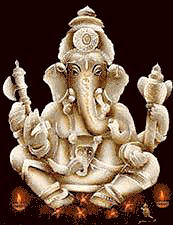About Lord Ganesha






Ganesh is the Ever-Blissful, elephant-headed deva (god) who is lovingly worshipped and revered by millions of people worldwide. Although Ganesh is known through the Hindu religion, Shri Ganesh transcends religion and is loved by many non-Hindu's. Ganapati is worshipped by both Vaishnavas (devotees of Vishnu) and Saivites (devotees of Shiva). It is for this Transcendent, All-Embracing, Auspicious Lord of the Ganas, Sri Ganesh, for whom this site is dedicated. Enjoy and much Peace to you!
The son of Shiva and Parvati, Shree Ganesh, is the God of Good Luck and Auspiciousness and is the Dispeller of problems and obstacles. He is also worshipped as the God of wisdom, wealth, health, celibacy, fertility and happiness. In the panchayatana puja, Ganesh is glorified as one of the five prime Hindu deities (Brahma, Vishnu, Shiva, Shakti and Ganesha) whose worship confers immortality and liberation..
This God of knowledge and the remover of obstacles is also the older son of Lord Shiva. Lord Ganesha is also called Vinayak ( knowledgeable ) or Vighneshwer (god to remove obstacles). He is worshipped, or at least remembered, in the beginning of any auspicious performance for blessings and auspiciousness.Vinayaka is the deity who removes all bad qualities, instills good qualities and confers peace on the devotee who meditates on him Vinayaka means that he is totally master of himself. He has no master above him. He does not depend on anyone. He is also called Ganapathi. This term means he is the lord of the ganas - a class of divine entities. This term also means that he is the master of the intellect and discriminating power in man. He possesses great intelligence and knowledge. Such knowledge issues from a pure and sacred mind.
Ganesha has four arms which symbolize his status as the universal ruler and establish his power over the four categories of beings - those who can live only in water, those who can live in water and on earth, those who can live only on earth and those who can fly in air. Significance of four : It was god Ganesha who instituted the four castes and the four Vedas. One hymn in Sri Bhagavat Tattva , says: 'In heaven, this child will establish the predominance over gods, on earth over men, in the nether world over anti-gods and serpents. He causes the four principles of the elements to move and is therefore four armed. In one hand, he holds a shell (to carry devotees to the truth), in another a discus (to cut devotees' attachments), in the third a club or a sweet (to reward devotees for spiritual activity) and in the fourth a lotus.His fourth hand's palm is always extended to bless people.' Thus, all aspects of Ganesh's form are filled with symbolic meanings.

"The mouse is the vehicle of Vinayaka. What is the inner significance of the mouse? The mouse has a keen sense of smell. The mouse is a symbol of the attachment to worldly tendencies (vaasanas). It is well known that if you want to catch a mouse, you place a strong-smelling edible inside the mouse-trap. The mouse also symbolizes the darkness of night. The mouse can see well in the dark. As Vinayaka's vehicle the mouse signifies an object that leads man from darkness to light. The Vinayaka-principle, thus, means that which removes all the bad qualities, practices and thoughts in men and inculcates good qualities, good conduct and good thoughts."
The esoteric meaning of Ganesha's elephant head --
The elephant is noted for its acute intelligence. Ganesha's elephant head symbolizes sharpness of intellect and the highest power of discrimination. Because of the purity of his intellect, Vinayaka is also called the giver of buddhi (intellect). He responds to the prayers of devotees and hence is known as Siddhi Vinayaka (the Vinayaka who grants what is sought). In a forest, when an elephant moves through the jungle, it clears the way for others to follow. Likewise, by invoking Ganesha, the path is cleared for our undertakings. The elephant's foot is so large that when it moves it can stamp out the footprints of any other animal. Here, again, the symbolic meaning is that all obstacles in the way will be removed when Ganesha is accorded the place of honor. The journey of life is made smoother and happier by the grace of Ganesha. When an elephant moves among the bushes, its path turns into a regular passage for all animals. It is thus a pacesetter for all animals." Similarly, Ganesha clears the path leading to Wisdom, Intellect, and Inner Peace.
Ganesha has two Siddhis (symbolically represented as wives or consorts): Siddhi (success) and Riddhi (prosperity). Wherever there is Ganesh, there is Success and Prosperity~ Wherever there is Success and Prosperity~ there is Sri Ganesh.
Ganesha is accepted as the god of learning and the Patron Deity of letters and scriptures. Ganesh's tusk is used by him in the writing of the epic, the Mahabharata. When Vyasa wanted to compose the Mahabharata, Brahma suggested Ganesha be his scribe. Vyasa agreed and Ganesha brought his broken tusk as a writing quill. Vyasa dictated the entire epic in verse. Ganesha recorded every word for Gods and men alike.
A unique combination of his elephant-like head and a quick moving tiny mouse vehicle represents tremendous wisdom, intellegence, and presence of mind.